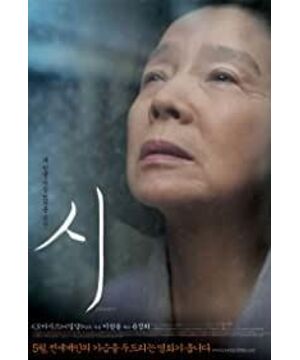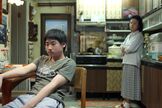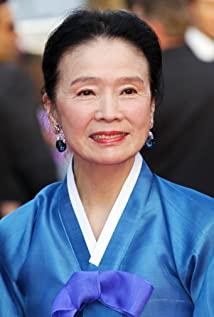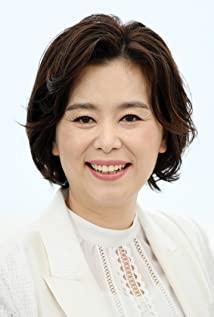The movie "Poem" is an excellent masterpiece written and directed by Li Cangdong himself. It is called "Poem", and it is written as "시" in Korean. It is worth mentioning that the Korean text on the poster was also written by Li Changdong himself. Before watching this movie, I was influenced by the title and preconceived that this movie would be as full of truth, beauty, poetry, and healing as I imagined.
But looking closely at the poster, there is nothing poetic and peaceful. Instead, the overall use of gray-blue tones . This gray-blue color reminds me of the seemingly endless rainy days in the rainy season, reminds me of a cloudy sky that turns yellow outside the window after being awakened from a deep sleep until dusk, reminds me of a muffled sound from a summer night The thunder sounded like a wet and broken dream. I think everything about the movie may be lurking in this foggy gray-blue, including the still unknown inner emotions about the protagonist.
The subject of the picture is an old man staring through the window. She looked thoughtful, as if trying to find an answer to a question, but couldn't figure it out. She is the heroine of this film, Han Meizi. The whole film shows the world in the eyes of a lonely old woman from the perspective of Han Meizi, an old woman, and then expresses the film's thinking on the two major themes of life and poetry.
Yang Meizi is beautiful and pure, sensitive and slender, full of childlike curiosity about the world. Like to dress up, love life. After the daughter divorced and went to work in a big city, she was left to live with her grandson who was in junior high school. Every day, she would do nursing work to maintain the lives of her grandparents and grandchildren. As she grew older, she suffered from Alzheimer's disease, but she loves poetry and signed up for poetry training classes and poetry reading sessions, hoping that one day she could be able to. Write your own poem. In such a seemingly peaceful life, undercurrents are surging.
The elderly man she was caring for asked her to have sex with her, and a female classmate in her grandson's class threw herself into a river, which completely disrupted her peaceful life. And the most ridiculous thing is that the reason for the girl's death was directly related to her grandson who lived under the same roof. It was because the grandson, together with the other five bad boys in the class, repeatedly violated the girl, that the girl had a mental breakdown and eventually died. At this point, the film officially entered the main plot.
The school intends to completely cover up the truth of the girl's death for the sake of reputation, and organizes the parents of the six troubled teenagers, including Yang Meizi, to pay 5 million won each to reach a settlement with the girl's parents. In the film, Han Meizi was on pins and needles when she participated in the reconciliation meeting for the first time, and even left in the middle and came to the outside of the store, writing "Flowers as red as blood" . It is conceivable that the reflection of this flower is the dead girl. At this time, how resentful she should be towards the school, the perpetrators, and how disappointed she should be with this indifferent society.
Later, she went to her grandson's school and looked at the innocent students on the playground. She wrote: "What do birds sing about?" At this time, Han Meizi should be thinking, if a girl is alive, she can enjoy her youth so happily, but the reality is often unsatisfactory. The teenagers who committed crimes, including their grandsons, have no remorse, the sun is still bright, the birds are still singing, the girl's pure and innocent soul is forever imprisoned under the endless river, but the world still looks peaceful and beautiful. , as if nothing had happened.
Later, Yang Meizi was forced to visit the mother of the victim girl in the countryside at the request of several other family members. Their purpose was to persuade the girl's mother to accept the compensation and reach a settlement. When Yang Meizi arrived, she found that there was no one at home, so she went to the field. On the way, she saw the plump apricots scattered on the ground. She was moved and wrote "Apricots fell to the ground, willing to be trampled for rebirth" . From this, it can be speculated that at this time, Xingzi in Yang Meizi's pen was referring to the defiled girl. "Rebirth", a word with religious connotations, also pinned on Yang Meizi's heartfelt wish for the girl to be redeemed. This also paved the way for the choice she made in the end. After a while, a woman came over, and they chatted about the weather. The whole picture was warm, so peaceful and warm. But the dramatic thing is that this woman is the girl's mother.
The sense of contradiction brought about by this drama gives people a special viewing experience. Lu Xun once said that tragedy is the destruction of beautiful things for others to see. The sense of contradiction reflected in the film is, in a sense, a tragedy. It comes from the emotional impact brought by the collision between the poetry of the title and the plot of the girl's murder, and also from Han Meizi's inner expectation of good humanity and the hopelessness and despair caused by the dark human nature and the despicable society in reality. From the perspective of God, we can only stay out of it, so it seems that we are outsiders, but the reality is only more ruthless and cruel than the movie presents, and we are not living in such a world.
Yang Meizi finally chose the goodness of human nature and told the police about her grandson's crime, and the police also took her grandson away. This is her confession to the victim girl as a family member of the perpetrator, it is also the redemption for the crimes committed by her grandson, and it is also the redemption for the kindness and humanity that she kept deep in her heart.
After the grandson left, Yang Meizi put the poem and the bouquet in the poetry training class and left in a hurry. Immediately followed by a series of empty shots, lively yellow dogs, old people enjoying the shade under the trees, teenagers and girls running under the sunset, and the bridge over the river. As a background sound, two voices reciting poetry appear. The voices of Yang Meizi and the suicidal girl came one after another, as if they were talking in the air. Then the camera gave a close-up of the girl's face, and finally turned to the rolling river that buried the girl's soul, and the whole film ended.
The movie did not explain where Yang Meizi went in the end, whether she was dead or alive, we don't know. I think it's a blank space designed by the director, an open-ended question for the audience. It doesn't have a standard answer, and you can even choose not to. I think it's a good movie because it's thought-provoking and it doesn't pursue the only interpretation of its embodiment. It is fascinating because it combines video art with poetic expression in literature, and it guides us to fill in the gaps with our own experiences. Therefore, it is diverse and secretive, but also rich and unique.
When I saw the river where the girl died at the end of the film, I remembered what Hermann Hesse wrote in "Siddhartha", "He saw the river flowing, but it was always here. It was always this river, but Renewing every moment." How ridiculous, our life as human beings goes from birth to death, from young to old, to death. But in this short and long time, the river never grows old, it is still young and will always be young.
Yes, we are living in such a colossal absurdity, an absurdity within reach, an absurdity of eternity that life itself bestows upon us. In such absurdity, we have nowhere to escape, we are the absurdity itself, we are the life itself. Like the river that never lingers for anyone, like the unreachable, self-luminous moon on that day. But we can choose to step into the river and touch the temperature of the river. We can choose to walk into the night and embrace the moonlight with our eyes. Just as each of us chooses to walk into life, trying to get rid of this meaningless life itself in our own way.
I think the poetry we seek is ourselves, long or short, delicate or clumsy, complete or broken. Even if it will eventually dissipate, it cannot be erased. It is an eternity created by ourselves, an eternity that belongs to each of us.
View more about Poetry reviews











